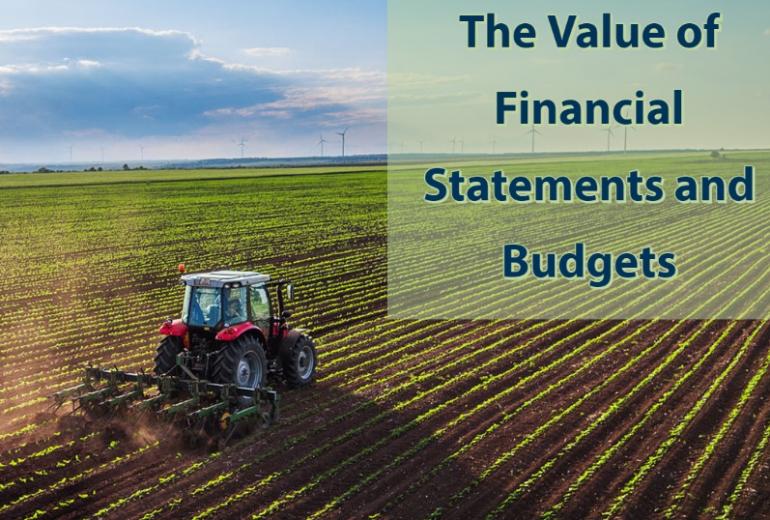Blog Series: Part 4 of Considerations to Make Your Farm Business Successful

The Value of Financial Statements and Budgets
This is the fourth blog of a four-part blog series full of valuable information for your farm business.
Now that all of the planning, research and capital assets required are in place and the business is up and running, the ability to measure the results of operations come into focus and will help in planning for future years.
With all of the moving parts that go into producing a crop it is extremely important that farmers have a detailed budget in place as leaving out even one line item could have drastic consequences. A good place to start when preparing a budget is with pulling the results for the prior season from your accounting software. These figures can be used as a building block to produce pro-forma financial statements to help manage cash flow, understand farm assets, and plan for future expenses.
There are three basic financial statements that businesses use with each one providing their own insight into the operations.
1. Balance Sheets
A balance sheet is a point in time snapshot of the assets and liabilities of your company. The balance sheet shows the evidence of how the business has performed over time. If the business has been profitable you would expect to see solid asset and net worth growth.
2. Income Statements
Sometimes referred to as “profit and loss statements,” income statements provide details on revenues and expenses incurred for a specified time period, typically quarterly or annually, but any specified time period can typically be generated from your accounting software. Income statements can be very helpful in determining the profitability of a particular crop or business line, demonstrating expense trends over time and providing needed information when filing taxes.
3. Cash Flow Statements
Cash flow statements show the movement of cash in and out of your operation over a defined time frame. Because revenues and expenses will fluctuate over the course of a year it is important to keep a close watch on cash flow so that you ensure that you have sufficient funds available when needed to pay the bills. Because of these fluctuations many business have access to an operating line of credit to fund temporary shortfalls. A cash flow statement will be utilized on a more frequent basis to operate the business.
In addition to the use for making internal management decisions, business financial statements may be utilized by various third parties in the following types of decisions:
- Credit decisions—Lenders use the entire set of information in the financials to determine whether they should extend credit to a business, or restrict the amount of credit already extended.
- Investment decisions—Investors use the information to decide whether to invest, the amount to invest and the value at which to invest. A buyer of the business uses the information to determine the price at which to buy a business.
- Taxation decisions—Government entities may tax a business based on its assets or income, and can derive this information from the financials.
The more complex your farming operation becomes the more likely you are to need expert advice and will likely turn to a licensed accountant for some accounting services and professional advice. For in-house accounting software, the options continue to evolve and can range from a generic all around option like QuickBooks to something tailor made for your industry. Review a guide to the various options.
Having the proper financial tools in place to track and measure the financial performance of your farm business are key to ensuring continued success and reduce the stress from unexpected events.
At Farm Credit of Central Florida, we provide financing for farms, land and homes. For more information visit us at www.farmcreditcfl.com or call us at 863-682-4117.